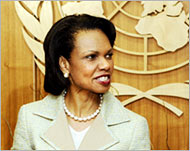N Korea to return to nuclear talks
North Korea has decided to end its year-long boycott of nuclear disarmament talks and resume negotiations this month with the US and four other nations.

The announcement was made on Saturday just as US Secretary of State Condoleezza Rice began a four-nation tour of the region, primarily to end the impasse.
North Korean Vice-Foreign Minister Kim Gye Gwan informed US Assistant Secretary of State Christopher Hill that his country was prepared to return to the talks during the week of 25 July.
Word of the North Korean decision came as Rice arrived in Beijing, the first stop on the tour.
A senior US official, who spoke with reporters accompanying Rice, said Kim had told Hill that North Korea’s purpose in the talks would be de-nuclearisation and that its negotiators would be intent on making progress.
North Korea’s official Central News Agency, KCNA, has confirmed the 25 July time frame.
“The US side clarified its official stand to recognise (North Korea) as a sovereign state, not to invade it and hold bilateral talks within the framework of the six-party talks,” the KCNA reported.
US restraint
 |
|
Condoleezza Rice had called North |
The six-party process, in addition to the United States and North Korea, involves China, South Korea, Japan and Russia. A Russian Foreign Ministry spokesman said the North’s decision was welcome news.
Three rounds of largely fruitless talks were held in 2003 and 2004, besides several discussions over the past year. North Korea blamed “hostile policies” of the United States, including statements by US officials that it considered inflammatory and disrespectful.
Rice had listed North Korea as an “outpost of tyranny” during her confirmation hearings in January.
US President George Bush and Rice have dropped such rhetoric lately, in an apparent effort to encourage North Korean flexibility. En route here on Saturday, Rice used no pejorative language about North Korea and stressed that the United States respects North Korean sovereignty and has no plans to attack the country.
North Korea was a priority for Rice heading into meetings on Sunday with Chinese President Hu Jintao, Premier Wen Jiabao and Foreign Minister Li Zhaoxing.
North Korean signals
There have been a number of recent signs of North Korean interest in ending the boycott. Five weeks ago, North Korean diplomats at the United Nations had expressed such interest during a meeting with two US State Department officials.
 |
|
President Bush has lately dropped |
North Korean leader Kim Jong-Il had also held out the possibility of a resumption of talks last month during a meeting with South Korean Unification Minister Chung Dong-young.
The United States had recently announced 55,000 metric tones of food donation for North Korea. The timing of the announcement was seen as a gesture toward North Korea.
Humanitarian aid
The administration said it was a humanitarian donation and denied that it was related to nuclear diplomacy. A range of possible dates for resuming the talks have been discussed. During a dinner here Saturday night, held at a Chinese Foreign Ministry dining facility, Kim said his government had chosen the week of 25 July, the US administration official said.
For years, the US government has believed that North Korea possesses at least two nuclear weapons. Intelligence analysts believe that the country may have acquired several more in the recent past.
North Korea readily acknowledges that it has a plutonium-based nuclear weapons capability. It confirmed to US officials three years ago that it also had a uranium-based programme, but has since retracted those statements.